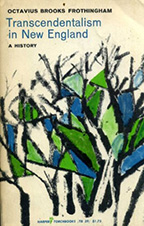A contemporaneous account of the movement
Transcendentalism in New England is a history of the 19th-century philosophical and literary movement that had a profound influence on American literature and thought. The author of this history, Octavius Brooks Frothingham, was a Unitarian preacher like many of the leading Transcendentalists. This book was published in 1876, while pioneering American Transcendentalists Ralph Waldo Emerson and Amos Bronson Alcott were still alive. Although it is unclear from the text if Frothingham ever met them personally, his writing indicates that he was definitely sympathetic to the movement. The relative contemporanaeity of this account is what makes it interesting, as Frothingham wrote this assessment of Transcendentalism shortly after the movement’s heyday, while its influence was still vibrant.
Frothingham begins by tracing the movement to its origins in Germany, particularly to the philosophy of Immanuel Kant. He then tracks the development of Transcendentalist thought through France and Britain to its appropriation by American clergy and scholars. Frothingham chronicles the establishment and progression of the movement in America, including a thorough look at Brook Farm, the experimental Utopian community founded by Transcendentalists in the 1840s. A series of chapters on individual Transcendentalists follows: Ralph Waldo Emerson, Amos Bronson Alcott, Margaret Fuller, Theodore Parker and George Ripley; plus a chapter on “Minor Prophets” briefly covering several other members of the school. Frothingham closes with a chapter on Transcendentalist literature, but it really doesn’t include much literary criticism. Rather, half its length is occupied by Emerson’s reprinted sermon on why he left the Unitarian ministry.
This is not so much a literary history as a philosophical history. Frothingham doesn’t talk much about the books and articles these figures published, but rather tries to ascertain each individual’s belief system, assessing how closely they adhered to or where they differed from the Transcendentalist party line. In making his case, Frothingham uses way too many extensive quotes, many of them several pages in length. If he truly wanted to educate his readers on Transcendentalism, he would have done better to explain matters in his own words rather than reproducing pages of text verbatim.
The idea of what constitutes a Transcendentalist has changed somewhat from Frothingham’s day. He held a very exclusive view of who truly belongs to the club. Frothingham praises Emerson highly and devotes at least two chapters to him, but considers him an Idealist rather than a Transcendentalist. “A Transcendentalist, in the technical sense of the term, it cannot be clearly affirmed that he was.” As to Fuller, “Strictly speaking, she was not a Transcendentalist.” Frothingham doesn’t even consider Henry David Thoreau worthy of discussion. Thoreau’s name is only mentioned twice in passing.
For those interested in learning just what Transcendentalism is and its effect on American literature and society, the best book I’ve read on the subject is the Modern Library’s volume The American Transcendentalists: Essential Writings. Although an anthology volume, editor Lawrence Buell provides a concise, enlightening introduction on the history, philosophical beliefs, and social agenda of the Transcendentalists that’s accessible to the general reader. Frothingham’s Transcendentalism in New England, on the other hand, will likely only appeal to historians of the era or theologians interested in splitting doctrinal hairs.
If you liked this review, please follow the link below to Amazon.com and give me a “helpful” vote. Thank you.
https://www.amazon.com/review/RB5TNFLPAWWWS/ref=cm_cr_srp_d_rdp_perm
Frothingham begins by tracing the movement to its origins in Germany, particularly to the philosophy of Immanuel Kant. He then tracks the development of Transcendentalist thought through France and Britain to its appropriation by American clergy and scholars. Frothingham chronicles the establishment and progression of the movement in America, including a thorough look at Brook Farm, the experimental Utopian community founded by Transcendentalists in the 1840s. A series of chapters on individual Transcendentalists follows: Ralph Waldo Emerson, Amos Bronson Alcott, Margaret Fuller, Theodore Parker and George Ripley; plus a chapter on “Minor Prophets” briefly covering several other members of the school. Frothingham closes with a chapter on Transcendentalist literature, but it really doesn’t include much literary criticism. Rather, half its length is occupied by Emerson’s reprinted sermon on why he left the Unitarian ministry.
This is not so much a literary history as a philosophical history. Frothingham doesn’t talk much about the books and articles these figures published, but rather tries to ascertain each individual’s belief system, assessing how closely they adhered to or where they differed from the Transcendentalist party line. In making his case, Frothingham uses way too many extensive quotes, many of them several pages in length. If he truly wanted to educate his readers on Transcendentalism, he would have done better to explain matters in his own words rather than reproducing pages of text verbatim.
The idea of what constitutes a Transcendentalist has changed somewhat from Frothingham’s day. He held a very exclusive view of who truly belongs to the club. Frothingham praises Emerson highly and devotes at least two chapters to him, but considers him an Idealist rather than a Transcendentalist. “A Transcendentalist, in the technical sense of the term, it cannot be clearly affirmed that he was.” As to Fuller, “Strictly speaking, she was not a Transcendentalist.” Frothingham doesn’t even consider Henry David Thoreau worthy of discussion. Thoreau’s name is only mentioned twice in passing.
For those interested in learning just what Transcendentalism is and its effect on American literature and society, the best book I’ve read on the subject is the Modern Library’s volume The American Transcendentalists: Essential Writings. Although an anthology volume, editor Lawrence Buell provides a concise, enlightening introduction on the history, philosophical beliefs, and social agenda of the Transcendentalists that’s accessible to the general reader. Frothingham’s Transcendentalism in New England, on the other hand, will likely only appeal to historians of the era or theologians interested in splitting doctrinal hairs.
If you liked this review, please follow the link below to Amazon.com and give me a “helpful” vote. Thank you.
https://www.amazon.com/review/RB5TNFLPAWWWS/ref=cm_cr_srp_d_rdp_perm



No comments:
Post a Comment